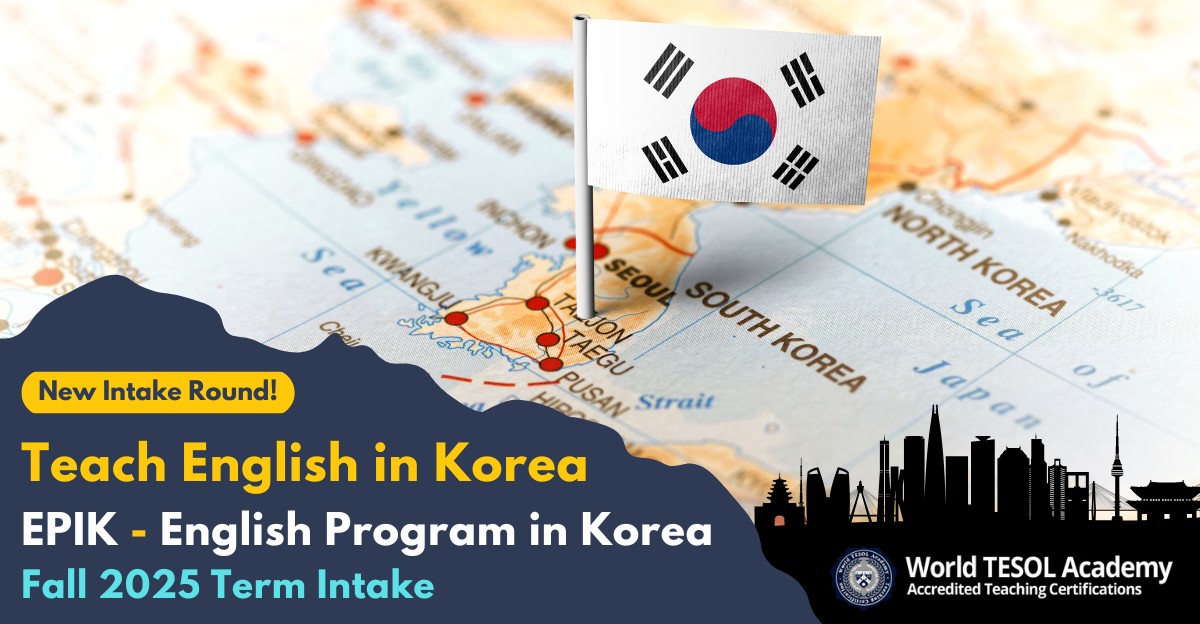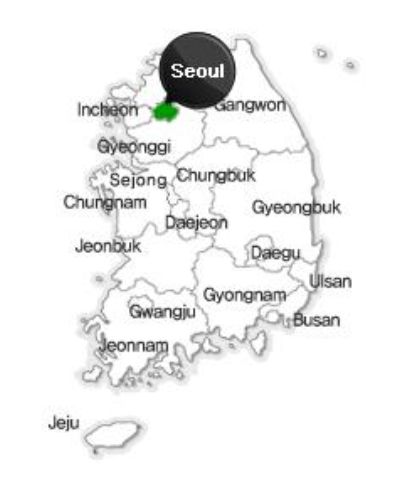
EPIK Fall Term 2025 — Teach English in Korea
Whether it’s K-pop, breathtaking sceneries, mouth-watering food, or cultural exploration, South Korea has something for everyone. With the possibility of experiencing ancient rich history while just moments later stepping into a modern metropolitan city, it’s no wonder that South Korea has turned into one of the most popular English teaching destinations in the world.
But how does one start teaching English in South Korea? If you are new to the teaching game, we understand that it may be a bit overwhelming when trying to figure out where to start.
Don’t worry, we got you covered! If you are interested in teaching English in Korea but don’t know where to start, we have a great tip for you — The EPIK program.

What is EPIK?
EPIK is an acronym for English Program in Korea, which is a government program affiliated with the Korean Ministry of Education that has the goal of improving Korean students’ and teachers’ English-speaking abilities, developing cultural exchange with other nations, and introducing new teaching methods in the Korean education system.
In order to reach these goals, EPIK provides opportunities for qualified native English speakers to come to Korea and teach English in the Korean public school system.
Benefits of teaching through EPIK
One of the many reasons why teachers apply to the EPIK program is due to all of the amazing benefits they can receive. This is especially useful if you are just starting out with your teaching career in Korea.
When teaching through EPIK, you will receive the following benefits (hover for more info):
| EPIK Orientation | Settlement Allowance |
| Accommodation is provided | Severance Pay |
| Entrance Allowance | Contract completion bonus/Exit allowance |
| Renewal bonus | Compulsory Medical Insurance |
For more detailed information about the different types of benefits you can receive via the EPIK program, please visit the official website.
Who can apply?
In order to qualify for the EPIK program, you need to meet the following requirements:
🗺️ Be a citizen of a country where English is the primary language:
- United Kingdom, Ireland, Canada, United States, Australia, New Zealand, or South Africa (Due to E-2 visa laws). Indian citizens are eligible if they are able to meet all other requirements and hold a teaching license in English according to the CEPA agreement (this requirement cannot be fulfilled by a TEFL/TESOL/CELTA certificate).
- Need to have studied from at least the junior high level (7th Grade) and graduated from a university in one of the seven countries listed above.
*Applicants from Quebec, South Africa, etc. where a large portion of the population does not speak English as their first language, need to provide proof that their schooling (from 7th year/grade through university) was conducted in English. Letters from the schools will be sufficient proof and must be submitted with the applicant’s initial application.
- Korean citizens that have legal residency in one of the 7 countries listed above are eligible to apply if they are able to provide proof that their schooling (from 7th year/grade through university) was conducted in English.
🎓 Hold a minimum of a Bachelor’s degree from an accredited university
- If you have a teaching license/certificate, B.Ed., M.Ed., or who majored in Teaching, TESOL, Second Language Studies (University of Hawai’i), or any other Education-focused major (Physical Education, Math Education, etc.), you do not have to possess a TEFL/TESOL/CELTA certificate.
- If you have a Bachelor’s degree in a field/specialization not listed above, you need to have a TEFL, TESOL, CELTA, etc. certificate of at least 100 hours or more from an accredited program to be eligible.
* This may be completed during the application process, so applicants may apply before they have obtained the certification as long as it will be finalized no later than 6 weeks before the final expected arrival date in Korea.
🧘 Be mentally and physically healthy
📚 Have a good command of the English language
🇰🇷 Have the ability and willingness to adapt to Korean culture and life
Note*: Male citizens of the Republic of Korea who are under the age of 35, must have either completed mandatory military service or have received an official waiver in order to be eligible for the program. For more information, please consult the following link https://www.mma.go.kr/eng/index.do
All EPIK positions are available based on an “on-request” basis from the Korean Provincial and Metropolitan Offices of Education.
Where will you teach?
When teaching through the EPIK program, you’ll be able to receive teaching opportunities in all metropolitan cities and provinces in Korea.
- Metropolitan Cities – Seoul, Busan, Daegu, Incheon, Gwangju, Daejeon, Ulsan, Sejong
- Provinces – Gangwon, Gyeonggi, Chungbuk, Chungnam, Jeonbuk, Jeonnam, Gyeongbuk, Gyeongnam, Jeju
Note*: Your workplace place may be in a school, the Office of Education, a training center, an English Experience Center or any other educational institute located in the jurisdiction of your Office of Education.
You may also be designated to work in multiple locations and the grade level of your students will not be made available until after your arrival in Korea.

What does teaching through EPIK look like?
Let’s now go through some of the most common questions that teachers have about teaching through EPIK.
What are the duties?
Teaching at a public school can be quite different from teaching at a private academy.
When you teach through the EPIK program, you’re expected to perform the following duties at your workplace:
- Assist and jointly conduct English classes with Korean teachers, as well as conduct extracurricular activities or English camps.
- Conduct English conversation classes for Korean students and teachers.
- Prepare teaching materials for English language education.
- Assist in developing teaching materials for English language education.
- Assist with activities related to English language education and other extracurricular activities.
- Demonstrate a good command of the English language, both written and spoken.
- Perform other duties as specified by your MOE/POE.
Note*: These listed duties serve as a general guideline. At the time of your placement, you’ll receive a more comprehensive list of duties from your Korean co-teacher.
All duties are carried out under the guidance of your MOE (Metropolitan Office of Education) or POE (Provincial Office of Education).
How long is the contract?
- The length of the contract is one year (52 weeks).
- You are able to renew your contract if there’s a mutual written agreement between the EPIK teacher, school, and MOE/POE.
- Before applying, it’s important to make sure that you are able to fulfill the contract and avoid early termination.
Will you teach alone?
When teaching at a public school through the EPIK program, you will have a Korean co-teacher who acts as a supervisor. This co-teacher will be a licensed Korean English teacher/teacher who speaks English fluently.
The co-teacher will be in charge of consulting, directing, and cooperating with you when it comes to class work, as well as life in and outside of the workplace. Their main role is to plan and teach English classes together with you, but they will also be planning and carrying out events at school, and administrative tasks.
What is the salary like?
The EPIK program uses a pay scale that scales based on your qualifications and teaching experience. The salary range is approximately 2,000,000 – 2,800,000 KRW per month (paid overtime is possible as well). Areas with a higher cost-of-living, such as metropolitan Seoul, may offer higher pay.
For a more detailed breakdown of the pay scale, please visit the EPIK program’s official website.
What are the work hours?
As an EPIK teacher, you’ll work eight hours per day, five days per week, excluding Saturdays, Sundays, and Korean national holidays (roughly 14 days annually).
Your weekly teaching hours will not exceed 22 hours unless requested by the MOE/POE or the school. Additional time outside of these hours is considered overtime and will be compensated accordingly. Some schools also have special classes after regular classwork, in which EPIK teachers are required to teach specific subjects or fields.
Class length varies, but generally, it’s 40 minutes for elementary school, 45 minutes for middle school, and 50 minutes for high school.
Note*: These numbers are subject to change, so make sure to verify them on the official website.
How many students are there in a class?
There is no national unified regulation for the number of students in a class. Most commonly, the number of students is bewtween 30-40. However, the class size is also affected by the location of the school, meaning that some schools may have smaller classes.
How old are the students?
When teaching through the EPIK program you will be teaching in Korean public schools, which follow the Korean education system.
The Korean education system is divided into 3 parts:
- Elementary school – 6-12 years old
- Middle school – 12-15 years old.
- High school – 15-18 years old.
This means that the students that you will be teaching range from 6-18 years old. However, the ages of the students can vary slightly depending on the individual student.
How about paid vacation?
In Korea, the school year begins on March 1st, and the vacation periods are within the summer and winter seasons.
The summer vacation starts at the end of July and finishes at the end of August (roughly 1 month in total). Winter vacation starts at the end of December and finishes at the end of January or early February.
EPIK teachers may be required to teach special programs during these periods, as it’s not uncommon for students to participate in special school activities during these vacation periods. In total
Note*: Start dates and end dates can vary between schools, as each school sets its own vacation period dates. For more detailed information about paid vacation, please refer to your individual contract.
Will you have access to support?
Each school’s administrative office is responsible for providing EPIK teachers with the necessary administrative services after placement. The Administrative offices are in charge of handling the contract, salary, insurance, tax, etc. These offices also help arrange housing before the EPIK teacher is appointed. for the EPIK teacher.
For any questions relating to the areas mentioned above, the teacher should contact their Korean co-teacher and have them relay your questions to the Administrative office.

When can you apply to EPIK?
The EPIK intake is available twice a year as it is based on the Korean public school calendar which has two semesters per school year – Spring semester and the Fall semester. The EPIK program offers a main intake for each semester, as well as a late intake if there are still positions to be filled.
🌸 Spring semester: The main intake starts in August.
🍁 Fall semester: The main intake starts in February.
⚠️ Applications for each intake open roughly 6 months in advance, which means that you are able to start applying for the Spring intake in August, and the Fall intake in February.
For the Fall 2025 semester, applications opened on Feb 1, 2025.
How do you apply to EPIK?
There are currently 3 ways to apply to the EPIK program:
1. Submitting a direct application through the EPIK Office

The most common way to submit your application is to submit it directly to EPIK via the official direct online application form.
For more detailed information about the direct application processes, as well as how to directly apply to the program via EPIK, please visit the official website.
2. Submitting an application through an official MOU/MOA organization

3. Submitting an application through an official recruitment agency

💡 Tip: A general timeline for the application process can be viewed here.
Please note that this is only a general reference and that the actual dates may vary.

New application option: EPIK Plus
For the Fall 2025 intake, EPIK continues to offer an additional application option which is EPIK Plus.
EPIK Plus is a recent addition to the EPIK program that provides priority processing, guaranteed placement, and an all-expenses-paid workshop.
When applying through the EPIK Plus option, your application will be expedited for faster processing, and upon completion of a successful interview and document review, the approved applicants will receive guaranteed placement in rural schools throughout the Jeju and Jeollanam (Jeonnam) provinces. Successful applicants will also receive an all-expenses-paid workshop on Jeju Island.
The teaching contract details for Jeju and Jeollanam provinces via EPIK Plus can be viewed here.
How to apply to the EPIK Plus program:
Under the section “Classification” at the start of the EPIK online application, please select “EPIK Plus (Jeju, Jeonnam)” and follow the instructions listed on the page. Once your application has been submitted, it will be expedited for faster processing.
For more information about EPIK Plus, please refer to the Official Website.
EPIK’s official online application preparation guide
The first step of the application process is to send in your online application.
You will be required to upload certain files when you submit your online application.
To get a better understanding of what is required for the direct application option via the EPIK website, applicants should first go through EPIK’s Official Online Application Preparation Guide for the Fall 2025 term intake.
This is a very helpful tool that goes into detail about what the applicants need to prepare for the initial online application.
You are going to have to prepare the following for the online application:
- Online Application
- Professional photo
- Two letters of recommendation (template available in the official guide)
- Current contract end date page (for teachers currently working in Korea)
- Proof of English education
- Tattoo photos
- Lesson plan worksheet/handout samples (optional but meriting)
Note*: Failure to prepare and submit the required documents can lead to processing delays.
For more specific information about each item, please download EPIK’s Official Online Application Preparation Guide.
If you wish to apply via an affiliated MOU/MOA organisation or a recruitment agency, please contact them directly for more information regarding their requirements and procedures.
Sending the remaining required documents
After you’ve submitted your initial online application and passed your interview, the next step will be to prepare and send the remaining required documents to the EPIK office. It’s recommended to prepare these as soon as possible as it can sometimes take some time to procure the required documents.
The required documents may vary from country to country, so please make sure that you prepare the documents that are required for your country of origin/residence.
To help you get started with the preparation, please refer to their official General Required Documents Guide. This guide is a simplified version of the full guide that will be sent directly to each successful applicant after passing their interview.
💡 Tip: Despite not all of these documents being necessary for the initial application, they do recommend that you start the process of obtaining them early on as they are to be submitted once you’ve passed the interview.
Just note that having these ready early does not guarantee acceptance at any stage in the application process.
Once you have sent the required documents, the EPIK team will help guide you through the next steps of the application process.
Additional EPIK resources
To stay up-to-date throughout the application period, they also recommend that applicants join the official Facebook group for the EPIK Fall 2025 intake (link not yet available).
You can also refer to the official website for more useful information about things such as the Mandatory Orientation Program and Life in Korea.
Familiarizing yourself with this information can help you build a solid understanding of what you will be facing when teaching in Korea, which in turn can help make your stay in South Korea all the more pleasant.
If you still have any unanswered questions, please read through their FAQ on the official website or directly reach out to EPIK at epik@korea.kr.
Good luck and happy teaching!






Leave A Comment